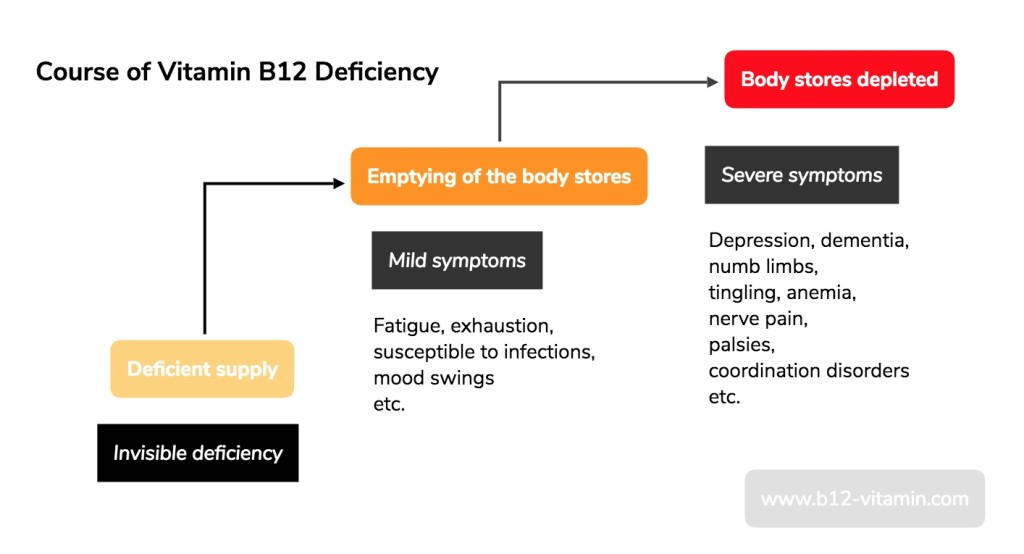This article gives an overview of the development and characteristics of vitamin B12 deficiency symptoms. The following key questions will be addressed:
|
Vitamin B12 Deficiency Symptoms
Vitamin B12 is an essential vitamin with many health benefits that cannot be produced by the body itself; we rely on a regular dietary intake of B12. The vitamin is stored in the liver, so that a small shortage can be compensated for, and it is only once levels fall significantly that more severe symptoms occur. Until this point, it is possible to completely miss a vitamin B12 deficiency as symptoms begin to manifest.
Initial symptoms begin to occur as the body’s stores diminish. Because there is such a diverse range of initial symptoms, vitamin B12 deficiency often goes unrecognised.
In the following, we aim to give readers insight into the symptoms of B12 deficiency so that the early signs can be detected and severe symptoms can be correctly identified.
The Emergence of Vitamin B12 Deficiency Symptom
How do the symptoms of B12 deficiency occur in the first place? Vitamin B12 plays a role in multiple essential bodily processes, which can be grouped into 5 basic functions:
5 basic functions:
- Synthesis of DNA (cell division, blood formation)
- Energy metabolism (energy production in the mitochondria)
- Lipid metabolism (structure of cell membranes, structure of myelin sheaths, protection of nerves in the central nervous system and brain)
- Synthesis of hormones and neurotransmitters
- Detoxification (homocysteine, cyanide, nitric oxide etc.)
If there is a case of B12 deficiency, all these areas are disturbed, which is why very different symptoms can occur as a result. This explains the enormous range of vitamin B12 deficiency symptoms.
The Most Common Vitamin B12 Deficiency Symptoms
The following symptoms are particularly common:
- Disrupted energy metabolism (chronic fatigue and tiredness, difficulty concentrating, muscle weakness)
- Nerve damage (pain, numbness, tingling, paralysis, coordination problems, memory disorders)
- Anaemia (poor performance, immunodeficiency)
- Disruptions to the metabolism of hormones and neurotransmitters (mental/psychological disorders, depressions, psychoses)
- Digestive disorders (constipation, diarrhoea)
- Inflammation (mouth, stomach and intestines)
A more detailed list of B12 deficiency symptoms is given at the end of this article.
Diagnosing Vitamin B12 Deficiency
If one or more symptoms of deficiency occur, it is advisable to first check the B12 status via a vitamin B12 deficiency test.
However, where several symptoms occur, deficiency is obvious and should urgently be treated with appropriate B12 supplements.
Treating Vitamin B12 Deficiency Symptoms
What should be done if there are clear symptoms of B12 deficiency? Firstly, it is important to bare in mind that:
- Symptoms of B12 deficiency can only be remedied to a limited extent through dietary changes (i.e. consuming more B12-rich foods)
- Often the underlying cause is an absorption disorders and therefore a higher dosage is needed
- Vitamin B12 supplements are the fastest and safest way to remedy symptoms
Depending on the severity of symptoms, different therapeutic approaches are recommended. While for mild to moderate symptoms an oral dietary supplement with a dose between 500 – 1000 µg is sufficient, for severe symptoms a high dose initial therapy is recommended. In this way, the body’s store of the vitamin is quickly replenished and the blood level rises rapidly.
Here are our therapy recommendations for various symptoms:
| Type of deficiency | Example of Symptoms | Therapy |
| Mild symptoms | Loss of energy, fatigue | 500 µg (oral) |
| Medium symptoms | Loss of energy, exhaustion, mood swings, immunodeficiency, diarrhoea, angular cheilitis (torn corners of the mouth) | 1000 µg (oral) |
| Severe symptoms | Anaemia, weight loss, sleep disorders, depression, confusion, numbness or tingling in limbs, paralysis, nerve pain, coordination disorders, sight problems | Initial therapy: or 4 weeks 5000 µg (oral) Maintenance treatment: |
Finding Suitable Supplements Online
| Dose/day | Active Ingredient | Online Search |
| 500 µg | Methyl-, adenosyl- and hydroxocobalamin | B12 + methylcobalamin + adenosylcobalamin + hydroxocobalamin + 500 µg + bioactive |
| 1000 µg | Methyl-, adenosyl- and hydroxocobalamin | B12 + methylcobalamin + adenosylcobalamin + hydroxocobalamin + 100 µg + bioactive |
| Initial therapy 5000 µg | Hydroxocobalamin | Hydroxocobalamin + high dose + deposit + 5000 µg |
For further information on active ingredients, see our article: Vitamin B12 Forms
Interim Conclusion
Key Points
|
Urine Tests for Detecting Vitamin B12 Deficiency
Especially the mild – but also sometimes severe – symptoms of vitamin B12 deficiency are often not recognised as such and therefore are frequently treated incorrectly. Awareness of the significance and prevalence of B12 deficiency is still relatively new. Vitamin B12 deficiency tests were therefore relatively uncommon among doctors for a long time and only in the last 15 years or so has B12 deficiency received more medical attention due to numerous studies. Fortunately, it is now being correctly diagnosed.
Today, it has become very easy to check your vitamin status at home thanks to the development of simple vitamin B12 MMA urine tests. In the case of one or more symptoms, a urine test is recommended to rule out B12 deficiency at an early stage and prevent symptoms from worsening.
Symptoms and Misdiagnosis
The reason why even the severe symptoms of deficiency are often not associated with B12 is because the vitamin is involved in many essential biological functions; the resulting symptoms therefore have an enormous range. B12 works at a very deep level in the body, but the symptoms appear on the surface. Consequently, many other factors are often conceivable causes of the same symptoms, which leads to frequent misdiagnosis.
Moreover, B12 deficiency continues to be confused with certain serious diseases, which also causes incorrect diagnosis. In the following cases, the B12 status should first be checked:
- Multiple sclerosis (MS)
- Alzheimer/dementia
- Autism
- Fibromyalgia
- Chronic pain
- Crohn’s disease
- Palsy
- Chronic mental illness (depression, paranoia, schizophrenia)
- Impotence and infertility
Vitamin B12 Deficiency Symptoms – Unfortunately Non-Specific
As we have discussed, the symptoms of B12 deficiency are not clear; there are a number of causes for very similar symptoms. Therefore, the occurrence of such symptoms is not sufficient to diagnose B12 deficiency. This is where the above-mentioned B12 urine test or a holo TC blood test can bring certainty. The serum test, on the other hand, which is still widely used, is actually of little informative value.
Below is a list of the most common B12 deficiency symptoms.
Symptoms of Mild Vitamin B12 Deficiency
These symptoms can occur individually or together.
Mental/psychological symptoms | Physical symptoms |
|
|
Symptoms of Severe Vitamin B12 Deficiency
Again, symptoms may occur individually or together.
Mental/psychological symptoms | Physical symptoms |
|
|
Vitamin B12 Deficiency and Folic Acid (Vitamin B9)
A lack of vitamin B12 can indirectly cause a folic acid deficiency, resulting in further symptoms. Folic acid (folate) interacts with B12 in the body; the former cannot fulfil all of its biological effects without the latter. B12 deficiency can even trigger a folic acid deficiency, even when there is a sufficient supply of the latter.
The symptoms of a folic acid deficiency are very similar to those associated with B12, since the two vitamins often have similar features and uses. To an extent, folic acid supplements may compensate for a B12 deficiency. Typically, this is the case for issues such as anaemia, but often irreversible neurological conditions are less simply alleviated. Symptoms resulting from a folic acid deficiency include:
- Anaemia, weakness, fatigue, difficulty concentrating, impaired blood formation, weakened immune system
- Disorders and inflammation of the oral and gastrointestinal mucosa, improper nutrient absorption, diarrhoea, loss of appetite, secondary illnesses
- Underdevelopment of foetuses, babies and children, birth defects
- Irritation of the central nervous system, irritability, memory loss, anxiety, depression



